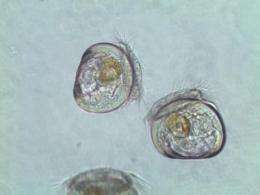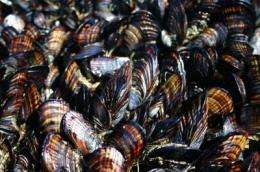Acidifying oceans could hit California mussels, a key species

Ocean acidification, a consequence of climate change, could weaken the shells of California mussels and diminish their body mass, with serious implications for coastal ecosystems, UC Davis researchers will report July 15 in the Journal of Experimental Biology.
California mussels (Mytilus californianus) live in beds along the western coast of the United States from Alaska to California. More than 300 other species share the beds or depend on the mussels in some way.
"Because these mussels play such an ecologically critical role, a decline in their numbers could impact a wide range of other organisms," said Brian Gaylord, associate professor of evolution and ecology at the UC Davis Bodega Marine Laboratory and first author of the paper.
Carbon dioxide, a greenhouse gas, is absorbed into the ocean, increasing its acidity. That acidity has increased by almost a third since the mid 18th century.
Mussels spend the first part of their lives swimming freely as larvae, before settling onto coastal rocks to grow into adults.
In the lab, Gaylord and his colleagues raised mussels from fertilization to the point where they were ready to settle, rearing them in both normal seawater and in water with two different conditions of elevated acidity. The acidity levels were based on projections by the Intergovernmental Panel on Climate Change, a Geneva-based scientific body established by the United Nations. One of the elevated acid levels assumed continued heavy use of fossil fuels; the other assumed a more optimistic scenario.

Compared to those raised in normal seawater, the young mussels living in the more acid waters had smaller, thinner, weaker shells, and as much as a third less body mass.
Weaker shells would make them more vulnerable to predators like crabs that crush their prey, as well as to carnivorous snails that drill through shells, Gaylord said.
Smaller body size would make them more likely to dry out at low tide and less able to withstand the energetically expensive process of metamorphosis from a free-living larva to a settled shellfish.
"Together these trends suggest that we're likely to see lower survivorship of young mussels as they return to shore," Gaylord said.
Although not an important fishery, the California mussel is a vital coastal species because so many other marine creatures depend on it for food and habitat.
More information: Gaylord, B., Hill, T. M., Sanford, E., Lenz, E. A., Jacobs, L. A., Sato, K. N., Russell, A. D. and Hettinger, A. (2011). Functional impacts of ocean acidification in an ecologically critical foundation species. J. Exp. Biol. 214, 2586-2594.
Provided by University of California - Davis













